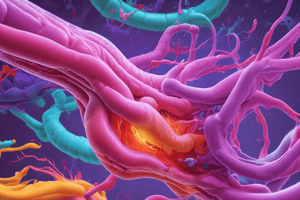Podcast
Questions and Answers
What is the classification of Promethazine?
What is the classification of Promethazine?
- Antidepressant
- Analgesic
- Antibiotic
- Anti-emetic (correct)
What are some other names for Promethazine?
What are some other names for Promethazine?
- Benadryl
- Dramamine
- Promethegan (correct)
- Zofran
Which of the following are indications for the use of Promethazine? (Select all that apply)
Which of the following are indications for the use of Promethazine? (Select all that apply)
- Depression
- Nausea (correct)
- Motion sickness (correct)
- Antibiotic treatment
Which of the following is a contraindication for Promethazine?
Which of the following is a contraindication for Promethazine?
Patients older than 2 can use Promethazine safely.
Patients older than 2 can use Promethazine safely.
What should be monitored while using Promethazine?
What should be monitored while using Promethazine?
What type of syndrome should be monitored for while using Promethazine?
What type of syndrome should be monitored for while using Promethazine?
What is the action of Promethazine?
What is the action of Promethazine?
Which of the following is a therapeutic effect of Promethazine? (Select all that apply)
Which of the following is a therapeutic effect of Promethazine? (Select all that apply)
Promethazine can cause _____ as an adverse reaction.
Promethazine can cause _____ as an adverse reaction.
Flashcards are hidden until you start studying
Study Notes
Promethazine Classification
- Anti-emetic medication used to prevent vomiting.
- Classified as a phenothiazine.
Alternative Names
- Commonly known as Promethegan.
Indications for Use
- Treats motion sickness, nausea, and vomiting.
- Effective for rhinitis and nighttime sedation.
- Used as adjunct therapy for preoperative and postoperative sedation.
- Employed in obstetric settings during delivery.
- Manages nausea and vomiting during pregnancy.
Contraindications
- Not recommended for patients younger than 2 years due to risk of respiratory depression.
- Avoid in individuals with asthma or pulmonary disease.
- Caution with concurrent use of CNS depressants, peptic ulcerations, and in comatose or dehydrated patients.
- Breastfeeding women should avoid this medication.
Nursing Implications
- Monitor patients for neuroleptic malignant syndrome, a serious adverse reaction.
- Discontinue medication four days prior to diagnostic skin testing.
- Halt administration 48 hours before a myelogram and resume only after 24 hours to avoid seizures.
- Use with caution in the last two weeks of pregnancy to prevent potential inhibition of platelet aggregation in newborns.
Myelogram
- A diagnostic imaging procedure using CT or X-rays with contrast dye to assess spinal issues.
Neuroleptic Malignant Syndrome (NMS)
- A rare but potentially life-threatening reaction to antipsychotic medications, including phenothiazines.
- Symptoms include altered mental status, autonomic instability, muscle rigidity, and hyperpyrexia.
Teaching Points for Patients
- Take oral promethazine with food or milk to minimize stomach upset.
- Administer 30 to 60 minutes before engaging in motion sickness activities.
- Avoid consuming alcohol while on this medication.
- Recommend sugarless gum, hard candy, or ice chips to relieve dry mouth discomfort.
Administration Routes
- Available in several forms: orally (PO), intravenously (IV), intramuscularly (IM), and rectally (PR).
Mechanism of Action
- Competes with histamine at H1 receptor sites, preventing histamine-mediated responses.
- Cannot reverse existing histamine reactions.
- High doses may produce a local anesthetic effect.
Adverse Reactions
- Possible side effects include thrombocytopenia, leukopenia, agranulocytosis, respiratory depression, dry mouth, and apnea.
Therapeutic Effects
- Provides antiemetic properties and alleviates motion sickness.
- Prevents allergic reactions mediated by histamine.
- Induces sedation.
Drug Interactions
- Interacts with anticholinergics, antipsychotics, tricyclic antidepressants (TCAs), and CNS depressants.
- Caution advised with epinephrine, MAO inhibitors, alcohol, and yohimbe.
Monitoring Parameters
- Regularly check hemoglobin (Hb), hematocrit, blood glucose, white blood cells (WBCs), platelets, and granulocytes.
- May interfere with blood grouping in the ABO system and mask positive skin test results.
Studying That Suits You
Use AI to generate personalized quizzes and flashcards to suit your learning preferences.




